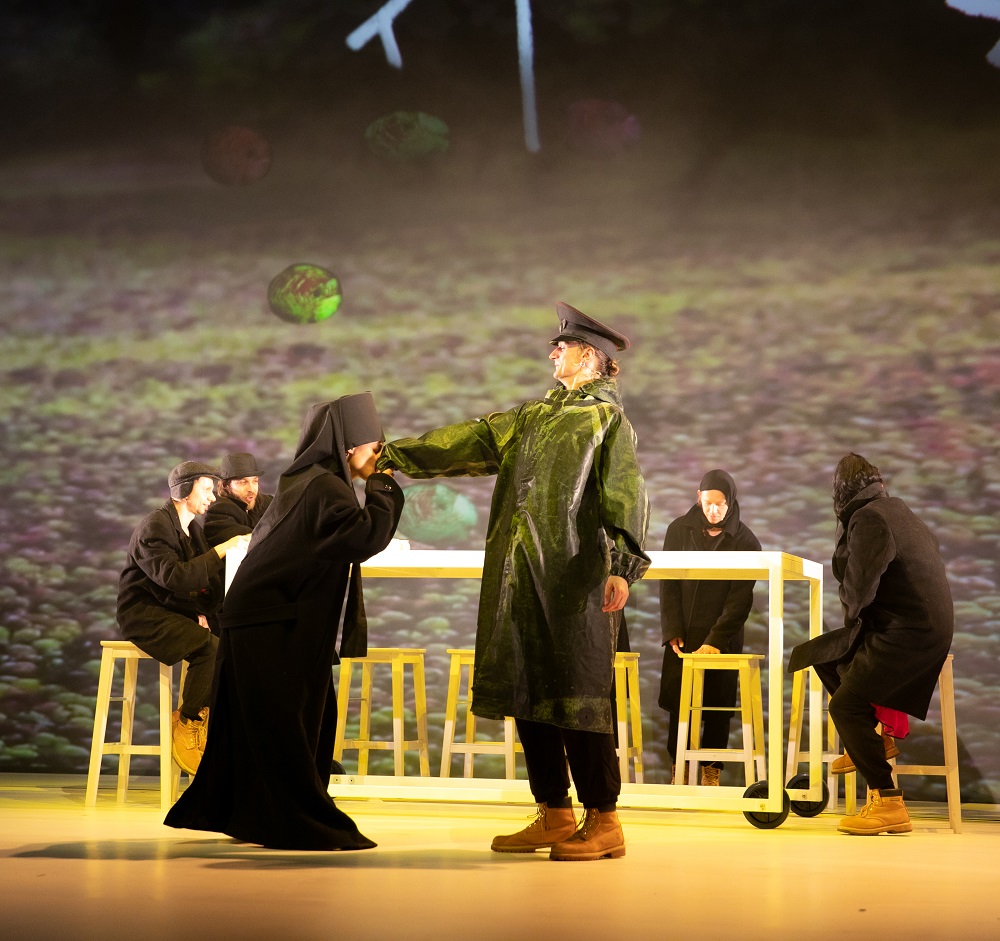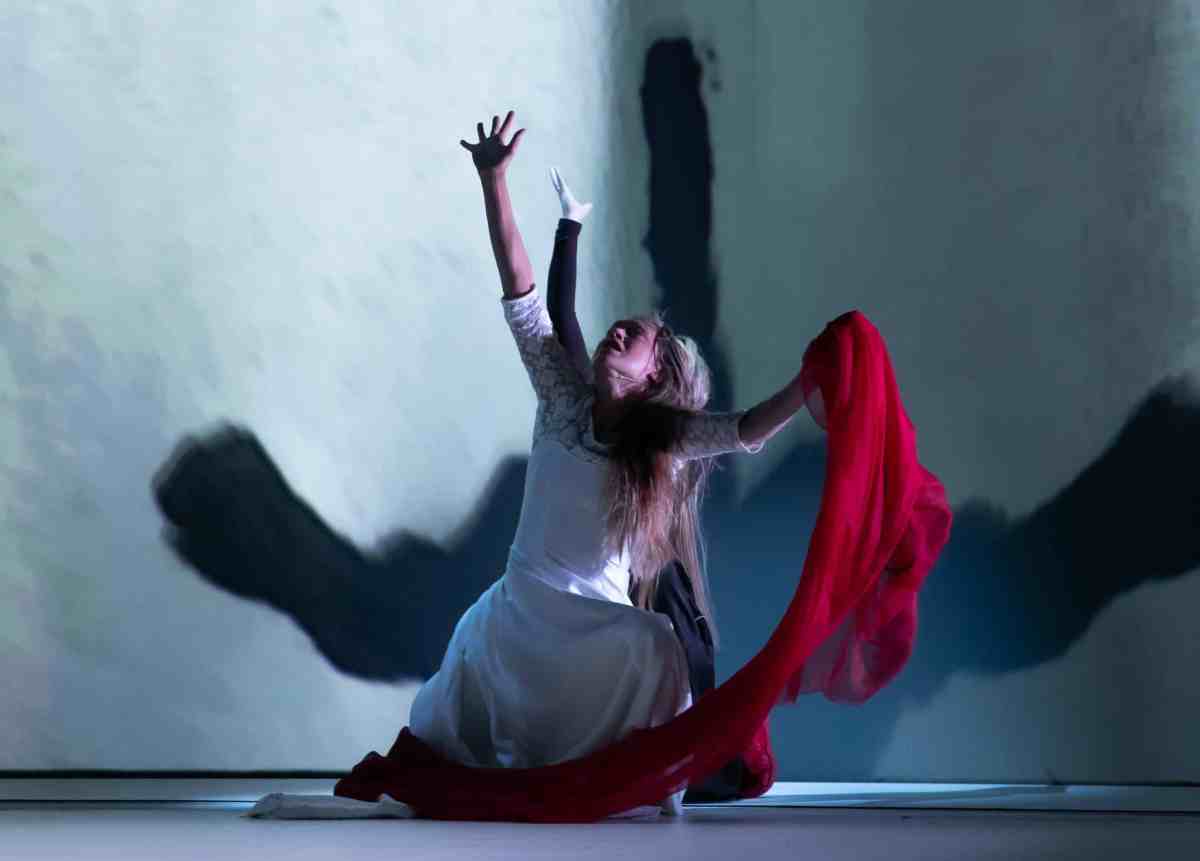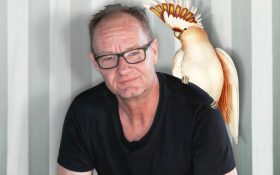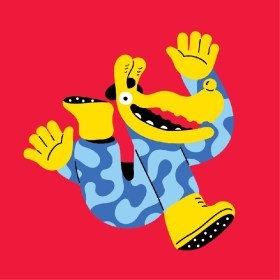Belarus Free Theatre’s Dogs of Europe is a quintessential festival show – an invaluable opportunity for local artists to witness the fiercely original work of this significant European company, and a production that’s dense, dazzling, hallucinatory and frustrating in equal measure.
When Alhierd Baсharevič’s 900-page satirical novel Dogs of Europe was first published in 2017 it read as speculative fiction. Today, one year after the invasion of Ukraine, Baсharevič’s vision of an expanded Russian empire that has absorbed parts of Asia and the Baltic nations into its ruthlessly totalitarian body politic seems chillingly prescient.
Adapted and performed by Belarus Free Theatre, this ambitious and often remarkable play takes on even greater resonance given that the 16-member company presenting it now operates entirely in exile. All the cast performing in Adelaide have been imprisoned at some point by Alexander Lukashenko’s Russian-backed dictatorial regime, and like Baсharevič himself (who fled Belarus following government crackdowns after protests in 2020, and whose novel is now banned in Belarus) the company would face arbitrary arrest, even torture, were they to return to their homeland.
While many of its scenes take place in 2049, Dogs of Europe begins in 2019, where a fanatical young man buys a radioactive island to be the birthplace of his intended new world. After sending private soldiers to kidnap a grandmother in her wheelchair, who he intends to make his wife, our would-be despot describes how his new world will have a new language, with no word for God and no insults.
Following this curious prologue, which also features a class of recalcitrant children impelled to create a time capsule, the play leaps forward in time to explore life in Russia’s ‘New Reich’ (a sprawling nation that now extends from Finland to Korea). Here we focus on a handful of villagers in the village of White Dew 13, including teenaged Mauchun (who smells of geese); his one-handed father, an accordion player; and the ‘holy fool’ Mr Kakouski, who is convinced that time has gone wrong and who tries repeatedly to escape the village.
The villagers’ routines and rituals are interrupted by the arrival of two strangers: a woman who drops in by parachute and who can speak a curious, seemingly fictional language, and the clean-cut Major Lebed, who is intent on rooting out subversives and who enlists the hapless Mauchun as his aide. Satirical sequences demonstrate the importance of the church and the military in daily life, while also suggesting the ever-present eye of the surveillance state; the dense woods surrounding the village are embodied by actors carrying pot plants with them as they move, in scenes evoking both Birnham Wood and comedy.
Read: Let loose the dogs of war…
After interval the narrative shifts to the League of European States, which is separated from the New Reich by a great wall. Here we meet Agent Teresius Skima, a policeman seeking to uncover the identity of a dead poet who wrote in a seemingly made-up language – a journey that takes him from bookshop to bookshop across countries that have access to all the knowledge in the world but are seemingly unable to recognise its value.
To track down the dead poet’s identity Skima must cross over into the New Reich – but is he prepared to face the truth of what he uncovers?
The above synopsis gives the impression that Dogs of Europe has a cohesive and traditional theatrical narrative. Reader, it does not.
Both artwork and call to arms, a surreal depiction of life in a totalitarian state and a fierce defence of democracy, Dogs of Europe employs a barrage of theatrical devices across its three-hour-plus running time in order to immerse the audience in its imagined yet frighteningly real world.

Belarus Free Theatre excels at visual imagery and physical theatre, and there is no shortage of such moments in this extended and challenging production. A naked woman rolls a huge ball of books across the stage; a Sisyphean task that perhaps references our inability to filter through the media barrage to focus on the facts that matter. Live foley artists burst balloons with knives to indicate gunfire as actors collapse on stage, red ribbons spilling from their guts. A white-clad officer takes a boy by the hand – suggestive of the seductive appeal of real power. A book is held open between a woman’s thighs in an act of literary cunnilingus. White feathers fall softly from the sky.
Haunting and evocative live music by violinist and drummer Mark Marczyk and vocalist and keyboard player Marichka Marczyk (of the band Balaklava Blues) and vivid rear projections (including animated pandas, slowly spreading Rorschach-like ink blots (perhaps referencing the stain spreading across Europe, or maybe hinting at the multiple readings that are possible in such a theatrically rich work) and burning books, their pages slowly crumbling to ash as the flames flicker in the darkness) are coupled with powerful dance sequences and strikingly choreographed scenes that emphasise the artifice of everything we’re watching.
There’s a hint of the Brechtian in the way the play distances the audience from the action – we are often observers of horror rather than invited in to feel the emotions of the characters first hand – (though this may also be an unintended side effect of translating Baсharevič’s dense prose for the stage and then translating it again in surtitles for an English-speaking audience). Elsewhere, the shocking imagery and barrage of ideas gives more than a nod to Artaud’s Theatre of Cruelty.
The flood of surtitles (the play is performed in Belarusian) is sometimes challenging to follow, especially in scenes where the actors stand directly in front of the unfolding text, but so much information is conveyed – or at least is attempting to be conveyed – that glancing away at the wrong moment to study an actor or a foley artist on the other side of the stage can become bewildering when important information is lost in the process. In a production so focused on stories and language, it’s ironic that the clear articulation of some of its key sequences is so frustratingly vague – though again, some of that could easily be intentional: a referencing of life under totalitarianism where obeying the rules is all that matters, even if they don’t make sense.
Dogs of Europe is so dense with imagery and ideas that one wishes the company had employed an outside eye to help dramaturg the work, tightening and focusing the drama and reducing its running time in the process. (The program notes that the company’s co-founder Nicolai Khalezin is striving to streamline the play into a leaner 150-minute version rather than the 180 minutes-plus version staged in Adelaide.)
While exhausting, it’s also an undeniably powerful production. Again and again the motif of burning books appears throughout the play, sometimes on film, at other times actual books, flames and sparks rising from their burning pages as they’re carried ritualistically across the stage. As the production ends, a chilling reminder is projected onto the screen at the rear of the stage: ‘Where the books were burned, in time people will burn.’
With the audience rising in ovation, Belarus Free Theatre’s co-founder Natalia Kaliada stepped onto the stage on opening night to remind us that much of what we have witnessed is truth masquerading as fiction. Democracies are fragile things, and those who seek to conquer must be opposed with every power at our disposal – whether that be a theatre production staged in secrecy in Minsk, as was the case with Dogs of Europe’s premiere, or for those closer to home, writing letters to politicians to urge them to take action.
Despite the deliberate chaos of the production, the message is clear: complacency is dangerous. Authoritarianism must be resisted.
Dogs of Europe
Belarus Free Theatre
Based on the novel by Alhierd Baсharevič
Dramaturg: Nicolai Khalezin
Co-Dramaturg: Mariya Bialkovic
Translation: Daniella Kaliada
Directors: Nicolai Khalezin and Natalia Kaliada
Set and costume designer: Nicolai Khalezin
Filmmaker, animator and video designer: Roman Liubyi
Lighting and projection designer: Richard Williamson
Associate lighting and projection designer: Beatrice Banyionite
Original music and live performance by Mark and Marichka Marczyk of Balaklava Blues
Choreographer: Maryia Sazonova
Videographer: Mikalai Kuprych
Ensemble: Pavel Haradnitski, Yuliya Shauchuk, Raman Shytsko, Maryia Sazonova, Stanislava Shablinskaya, Aliaksei Saprykin, Ilya Yasinski, Kateryna Vostrikova, Mitya Savelau, Kiryl Kalbasnikau and Darya Andreyanava.
Tickets: $40 to $109
Dunstan Playhouse, Adelaide Festival Centre as part of Adelaide Festival
2-6 March 2023
The writer visited Adelaide as a guest of Adelaide Festival.





